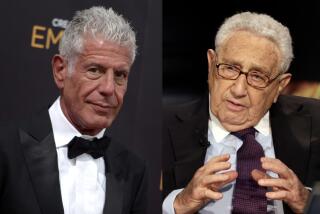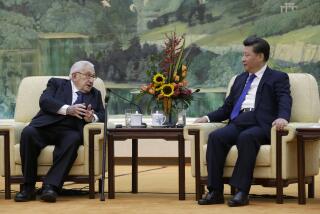But Says He Will Back Ratification : Kissinger Sees Shortcomings in Treaty
- Share via
Former Secretary of State Henry A. Kissinger on Thursday criticized the new treaty to eliminate intermediate-range missiles because it does not also require reductions in conventional forces, but he said he would support its ratification.
“I would not have made the agreement” signed by President Reagan and Soviet leader Mikhail S. Gorbachev, Kissinger told a news conference in Los Angeles. “On the other hand, I am not opposing ratification. . . . We cannot keep making agreements that we don’t ratify.”
“My basic concern is not to separate nuclear from conventional disarmament,” Kissinger said. “To leave the Soviet conventional forces unimpaired while the West undermines its nuclear capability (is dangerous). . . . The West has relied, for better or worse, more on nuclear weapons than the Soviets have.”
He offered an analysis of the treaty’s impact.
Continued Threat Seen
“The Soviet threat to the United States has not been reduced because those weapons (to be eliminated) weren’t aimed at the United States,” he said. “The Soviet threat to Europe has also not been reduced, because the Soviets have huge amounts of weapons of longer range that they can use from their own territory. . . . The American capacity to retaliate from Europe has been eliminated.
“You can say we can retaliate from the United States, and that is the issue,” he continued. “Does it make a psychological difference to have weapons there (in Europe) that the Europeans can see and know are assigned to them, or doesn’t it? Secondly, does it make a difference to us having . . . weapons there that the Soviets can see and figure that if they attack, these are under some autonomous control of the NATO command?
“These are psychological problems,” he said. “I would answer both in the affirmative.”
Kissinger added that it was his conjecture that summit participants “have agreed to more than they have announced.” He said he had no inside information, however.
Linkage Stressed
Kissinger and former President Richard M. Nixon recently proposed eliminating medium range missiles in stages--50% now and 50% after a substantial withdrawal of Soviet conventional forces from Europe. Such linkage with conventional forces is “now necessary” before reductions in long-range missiles are made, Kissinger said.
Asked if he thought the United States was being lulled into complacency by Gorbachev’s pleasing personality, Kissinger said he was concerned about “Gorby-fever.” He said Gorbachev did not rise to the top of the Kremlin by acting like a choirboy.
“He’s an interesting, charming man,” Kissinger said, pausing for effect.
“So what?
” . . . The man who conducted foreign policy most effectively up to now in the post-war period was Richard Nixon. He would never claim that personal charm was the method he used. And since he was wary of Americans,” Kissinger said wryly, “he was not about to trust Russians.”
More to Read
Sign up for Essential California
The most important California stories and recommendations in your inbox every morning.
You may occasionally receive promotional content from the Los Angeles Times.












